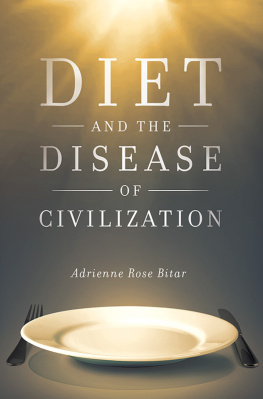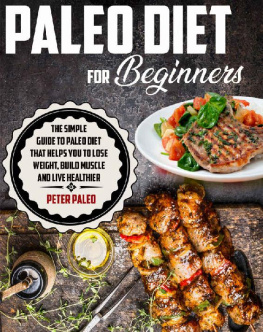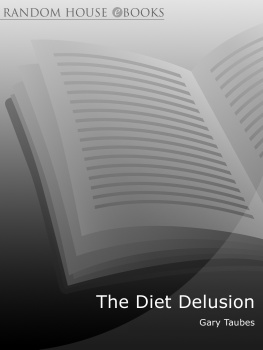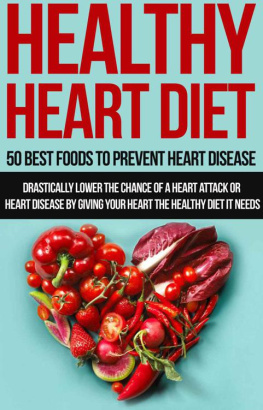ACKNOWLEDGMENTS
Diet and the Disease of Civilization is the product of untold institutional generosity and inspirational mentorship. My professors, advisors, colleagues, classmates, and family not only supported my research but also inspired my thinking and buoyed my faith. I am indebted to them and the institutionsStanford and UC Berkeley, mainlythat continue to value the intellectual work of the humanities.
At the Schlesinger Library at the Radcliffe Institute for Advanced Study, culinary archives revealed scores of business-sponsored health advice documents and recipes. Grants awarded by the Marilyn Yalom Research Fund of the Michelle Clayman Institute for Gender Research and the Stanford Community Engagement and Vice Provost Graduate Research Opportunity programs sponsored interviews, the acquisition of a private collection, and the purchase of nontraditional research materials. Without the funding provided by the Modern Thought and Literature program at Stanford University and Mellon Foundation Dissertation Fellowship, this work would never have been conceived, much less completed. The Lane History of Science, Medicine, and Technology Grant program sponsored research that contributed to the Pacific Islands chapter.
I wish to recognize Etta Madden and Lyman Tower Sargent for editing a special edition of Utopian Studies on food and so providing my work with a powerful intellectual framework. A version of the Paleo chapter was published in Utopian Studies in 2015. Benjamin Reiss deserves much gratitude for his thorough and insightful comments on this manuscript draft. My anonymous readers also carefully reviewed this book and offered helpful critique. Interviews with dieters, public health activists, and diet book authors provided personal insight. I am grateful to Leslie Mitchner and the staff of Rutgers University Press for supervising the development of this manuscript with care and acuity. Lisa Banning, Jenny Blanc-Tal and Phoebe Keller have been infinitely patient with edits and revisions.
Very recently, Sandra Greene, Aaron Sachs, John Barwick, Joan Jacobs Brumberg, and Penny von Eschen have warmly welcomed me into the History department at Cornell University. Rosemarie Garland-Thomson helped me think through the next phase of this research. In food studies, I thank Carolyn Dimitri and Krishnendu Ray for hosting me as a visiting scholar at New York University. Enriching conversations and the Marion Nestle Food Studies Collection aided this research immensely. Ken Albala and Polly Adema at University of the Pacific invited me to discuss food fads with a talented group of food studies scholars and Alissa Merksamer welcomed me to the food world in San Francisco.
This book began with my professors at University of California, Berkeley. My research ideas took shape when Professors Moran and Lovell introduced me to American studies in September 2006. In the crowded lecture hall for Food in America, Professor Moran lectured about an America that I thought I knew but actually was just discovering. Professor Lovells keen eye for folk art and agile way of thinking opened me to the possibilities of artistic interpretation of everyday objects. Greil Marcus modeled the practices of cultural criticism, setting an example for intuitive, responsible, and astute analysis of music and culture.
At Stanford, many friends and classmates in modern thought and literature deserve gratitude for their support and camaraderie: Cam Awkward-Rich, Karli Cerankowski, Vanessa Chang, Alexis Charles, Maria Cichosz, Lindsey Dolich Felt, Corey Johnson, Ronmel Navas, Laura Rogers, Max Seuchting, Vasile Stanescu, and Rebecca Wilbanks. The directors of modern thought and literatureMichelle Elam, Ursula Heise, and Paula Moyaguided the program with purpose and skill. Rachel Meisels and Monica Moore always ensured the mechanics of modern thought ran smoothly. Mary Munil acquired obscure texts through interlibrary loan. Scott Bukatman, Ramon Saldvar, Kyoto Sato, Fred Turner, and Tobias Wolf provided invaluable support and academic counsel. The kind, brilliant people who make up Stanford University deserve countless thanks, but the institution itself also deserves recognition. Stanford University should be praised for its generosity and institutional commitment to art and the humanities.
My family has long encouraged these research interests and gratitude goes to Elias Goodman, Nathaniel Johnson, Lev Abraham Jacobson, Tamara Jacobson, David Ezekiel Johnson, Muriel Weintraub, and Lynn Seller. I am also grateful to the late Rita Goodman, Abraham Goodman, and Adelyn Johnson. Dena Goodman reviewed many early proposals of this book and long encouraged my academic pursuits. Daniel Goodman provided valuable insight into detoxification and the history of fasting. Judith Goodmans commitment to education and undeterred pursuit of an advanced degree inspired me from the start. This book benefited from her careful legal perspective and its author benefited even more from her tenacity and encouragement. Thank you.
I have others to thank for their kindness and kinship: George Bitar, Janet Bitar, Vanesa Bottger, Ruth Bram, Natalie Glatzel, Phoebe Katzenbach, Anne Leicher, Zoe Maxon, Adriana Monroy, and Juliette Mrockowski. Judy and Stan Phillipss enthusiasm for my endeavors brought joy to this research over the years. Discussions with Ateeq Suria and others on the Graduate Student Council broadened my thinking to include engineering, politics, and business. I thank Summer Shafer for her comradeship in American Studies 10 and Melissa Fall for sharing her literary talents in our writing seminars.
My dissertation committee at Stanford set an example for academic inquiry, interdisciplinary creativity, and personal generosity. Bryan Wolf unearthed the layers of meaning in American art and the subtle, powerful codes of culture. Professor Wolf opened me to the possibilities of art and I saw how to seereally seethrough his brilliant eyes. His analysis of Thomas Coles Expulsion from the Garden of Eden and Winslow Homers The Morning Bell still provide a model of intellect and empathy.
Estelle Freedman modeled an example of commitment and scholarly rigor, guiding me through the challenges of historical research with grace. Her attention to the history of women and gender analysis was critical to organizing my arguments and archive. Her sensitive, smart analysis of primary sources sets the standard for archival research. Professor Freedmans unflinching commitment to historical inquiry proved to me tenfold the values of perseverance and conviction.
Shelley Fisher Fishkin supported this book from proposal to publication. Her insights into American literature and skills of cultural analysis always sparked new ideas. My writing and thinking improved with every meeting and comment tagged in track changes. The joyfulness with which she approached the detective work of research motivated me to consider alternative viewpoints and unusual sources. Professor Fishkin never failed to inspire me with the power of her academic research and the warmth of her mentorship. I owe a great deal to her.
And I thank Eilyan Bitar for his steadfast faith and encouragement. He showed me, early on, what it means to share the joy of learning. Eilyans work demonstrates how good research really can improve the world and he inspires me to work harder, write more, and, together, revel in the joys of education and discovery. I thank him for the gift of his love and respect.
Even as I thank all these extraordinary friends and scholars, one debt of gratitude seems impossible to articulate. I got lucky to have a talented speechwriter and newspaper reporter for a father, but was even luckier that, with patience and love, my father taught me how to write. As my lifelong editor, Michael McIntyre Johnson has read thousands of pages over the last fifteen years, correcting grammar mistakes, reordering paragraphs, chopping up long sentences, and always adding in dashesto emphasize, of course, the strength of my claims. This onemy father, my editoris for you.
Next page









